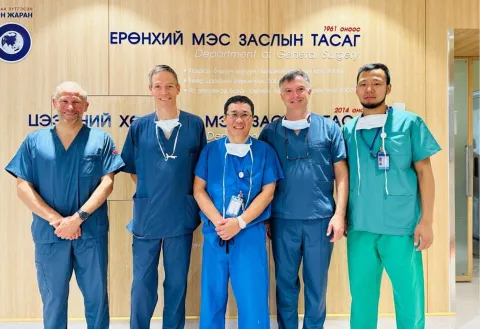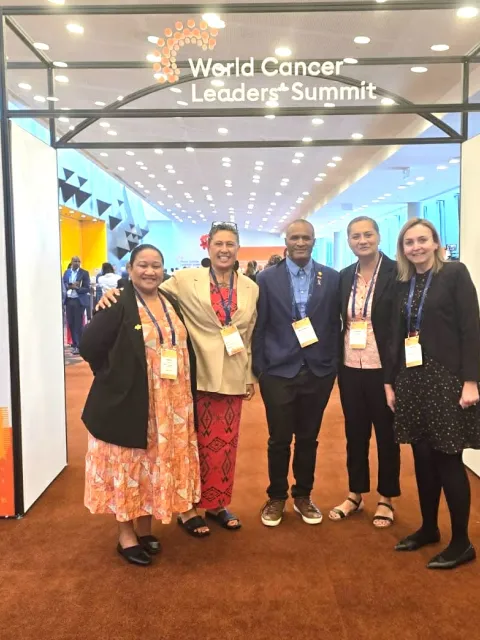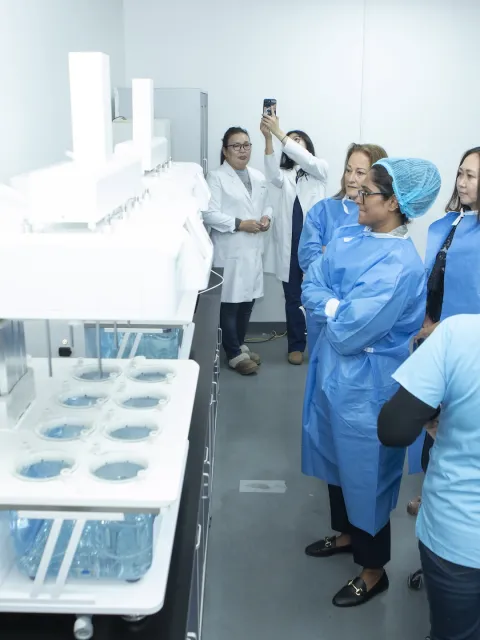Geneva University Hospitals and the National Cancer Center of Mongolia unite to advance cancer care in Mongolia
The partnership, which was initiated at the UICC’s World Cancer Congress in 2022, focuses on the exchange of knowledge and expertise in medical practices, notably on immunotherapy and minimally invasive surgery. Interview with Professors Triponez and Michelin from the HUG.

Visit by doctors from the Geneva University Hospitals (HUG) to the surgery department at the National Cancer Center of Mongolia (NCCM). From left to right: Prof. Michielin (HUG), Prof. Triponez (HUG), Dr Ganzorig (NCCM), Dr Karenovics (HUG) and Dr Munkh-Orshikh (NCCM).
HIGHLIGHTS
- The Geneva University Hospitals (HUG) and the National Cancer Center of Mongolia (NCCM) are pursuing a partnership to advance cancer care in Mongolia, following initial meetings at the World Cancer Congress in Geneva in 2022.
- The partnership involves the exchange of knowledge and expertise between the two institutions, with HUG sharing its experience with advanced treatments and their side effects, and learning from the NCCM on the high volume of specific cases it handles.
- A delegation from HUG visited the NCCM in Ulaanbaatar in 2023, observing and participating in various surgical procedures, conducting workshops, and exploring potential collaborations and training opportunities.
- HUG will host Mongolian oncologists and surgeons for three-month training periods in Geneva, focusing on practical skills and advanced treatments, while Swiss experts will continue visiting Mongolia to provide hands-on training and support.
Following preliminary talks between the Mongolian Consul and Alain Kolly, Deputy General Director of the Geneva University Hospitals (Hôpitaux Universitaires de Genève, HUG), a delegation from the National Cancer Center of Mongolia (NCCM) met with Prof. Olivier Michielin, Chairman of the Department of Oncology at HUG, at UICC’s World Cancer Congress in Geneva, in October 2022.
“Meeting at the World Cancer Congress enabled us to renew relations for medical knowledge exhange between the two countries that go back over twenty years, and lay the foundation for future visits,” said Prof. Triponez, Chairman of the Department of Surgery at HUG.
The delegation, which included the Mongolian Ambassador to Switzerland, the Director of NCCM, and key surgical staff, shared common interests in advancing medical oncology and surgical treatments.
“Much of the treatments that will appear in Mongolia are those we already use extensively here. These collaborations therefore allow us to share our experience with these treatments and their side effects, and facilitate a meaningful transfer of knowledge, significantly accelerating the learning curve for new therapies and surgical techniques in Mongolia.”
– Prof. Olivier Michielin, Chairman of the Department of Oncology, Geneva University Hospitals (HUG)
The focus of the discussions at the World Cancer Congress was on immunotherapy, a crucial component of modern oncology not yet widely accessible in Mongolia, as well as on enhancing skills in minimally invasive surgical procedures such as laparoscopy and thoracoscopy, which allow minimally invasive surgery of the organs in the abdomen and the thorax.
“The surgeons in Mongolia are already highly skilled, but they seek to refine their techniques in minimally invasive procedures. What also makes these exchanges so beneficial is that the infrastructure in Mongolia is capable of supporting advanced techniques such as laparoscopy. Their facilities are well-maintained, and their staff is highly competent.”
– Prof. Frédéric Triponez, Chairman of the Department of Surgery at HUG
From 27 August to 2 September 2023, a delegation from HUG, comprising Prof. Michielin, Prof. Triponez, and Dr Wolfram Karenovics, Staff surgeon in the Thoracic and Endocrine Surgery Division at HUG, visited the NCCM in Ulaanbaatar.
They observed and participated in various surgical procedures, including thyroid operations, pulmonary lobectomies, liver transplantions and esophagectomies. This hands-on experience enabled them to identify areas where Swiss expertise could contribute to improving patient outcomes.
Additionally, Drs Michielin, Triponez and Karenovics conducted workshops for the local staff, sharing insights into the latest advancements in cancer treatment, with a particular focus on immunotherapy and minimally invasive surgical techniques. Furthermore, the professors held discussions with the NCCM's leadership to explore potential collaborations and training opportunities. These meetings aimed to establish a framework for ongoing knowledge exchange and support between the two institutions. The visit also incorporated elements of cultural exchange, providing the Swiss experts with a deeper understanding of the local context in which the NCCM operates.
During the visit, the HUG team also met with Professor Chinburen, a former NCCM director and now a member of the Mongolian parliament, who expressed confidence about the partnership, noting the invaluable knowledge and skills gained from Swiss colleagues.
“Our aim is to ensure that the conditions are right for the collaboration to succeed, including proper equipment and training support. This partnership provides an opportunity for us to share our advanced surgical techniques while also learning from the high volume of specific cases they handle, particularly in liver surgery.”
– Prof. Frédéric Triponez
This initiative builds on a long history of medical exchange between Switzerland and Mongolia, dating back to the late 1990s, when Swiss surgeons and anaesthetists created the Swiss Surgical Team (SST) to help develop surgical and anesthesia skills in Mongolia through annual missions funded by the Jürg Ammann Foundation until 2015.
Through these missions, 30 Mongolian doctors received training fellowships of three to six months in Swiss hospitals, with support from the Swiss Agency for Development and Cooperation. Many current NCCM leaders, such as Dr Chinburen, Dr Ganzorig (thoracic surgery), Dr Denis (ENT/reconstructive surgery), and Dr Ganbaatar (general surgery), claim to have benefitted from this training.
"We have a long tradition of collaboration with Mongolia, especially on a surgical level. Now, we are extending this to medical oncology,” said Prof. Michielin.
The next phase in the collaboration between the two centres involves detailed planning for the exchange of medical professionals. HUG will host Mongolian oncologists and surgeons for three-month training periods in Geneva, focusing on practical skills and advanced treatments, while Swiss experts will continue visiting Mongolia to provide hands-on training and support.
Funding is a critical aspect, with HUG seeking financial support to cover the living expenses of Mongolian fellows during their stay in Geneva. The Mongolian side will handle travel costs, and HUG aims to provide a stipend to ensure the visiting doctors can live comfortably during their training.
“This collaboration is not just about transferring knowledge; it's about building lasting relationships that empower both sides to tackle cancer more effectively. By having Mongolian doctors come here for training or by sending our doctors to Mongolia, we can greatly reduce the time required to learn new oncological therapies and surgical approaches.”
– Prof. Olivier Michielin
Last update
Wednesday 26 June 2024
